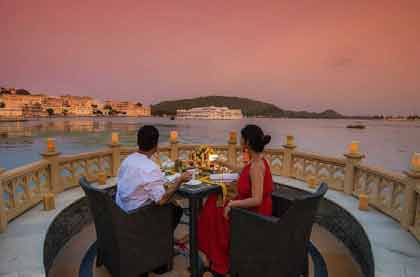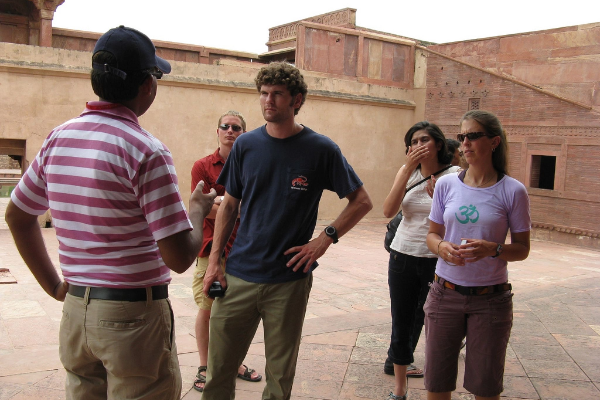
ATTRACTIONS & PLACES TO VISIT AND EXPLORE IN JODHPUR
Jodhpur, the second largest city in Rajasthan is popularly known as the Blue City. The name is clearly befitting as most of the architecture – forts, palaces, temples, havelis and even houses are built in vivid shades of blue. The strapping forts that tower this magnificent city sum up to a spectacle you would not want to miss. The mammoth, imposing fortress of Mehrangarh has a landscape dominating a rocky ridge with the eight gates leading out of the fortress. The new city is located outside the structure. Jodhpur is also known for the rare breed of horses known as Marwari or Malani, which are only found here.
Jodhpur marks its origin back to the year of 1459 AD. The history of this prosperous city revolves around the Rathore clan. Rao Jodha, the chief of Rathore Clan is credited with the origin of Jodhpur in India. The city is known to be built in place of the ancient capital, Mandore of the state of Manwar. Hence, the people of Jodhpur and surrounding areas are commonly known as Marwaris. Also, it is believed that the relics of Mandore can still be witnessed in the Mandore Gardens.
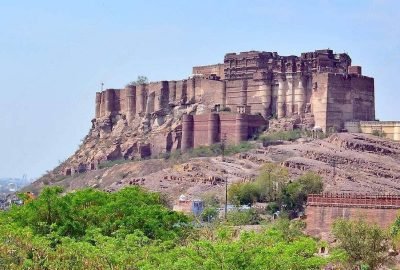
MEHRANGARH FORT
Rising perpendicular and impregnable from a hill which is 125 metres above Jodhpur’s skyline is the Mehrangarh Fort. This historic fort is one of the most famous in India and is packed with history and legends.
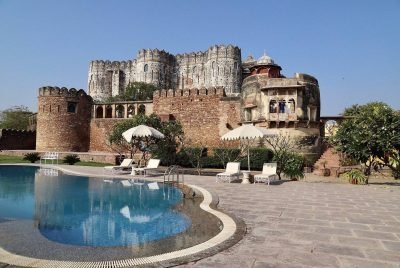
KHEJARLA FORT
The 400-year old Khejarla Fort is situated in a rural setting. The stunning red sandstone monument, now a hotel, is an example of Rajput architecture. Visitors will be mesmerised by the fort's picturesque settings.
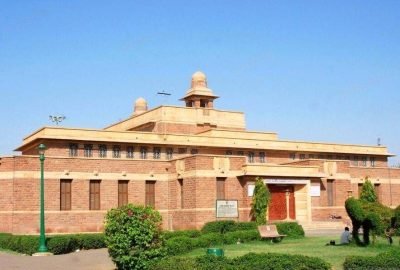
GOVERNMENT MUSEUM
The Soniji ki Nasiyan, popularly known as the Ajmer Jain Temple, honours Risabh or Adinath and is a superb example of elaborate building. It has a red stone entryway and a marble stairway within that is inlaid with carvings of the saintly Tirthankars,
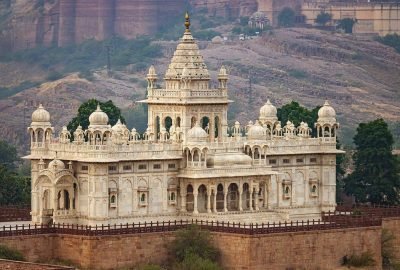
JASWANT THADA
his milky white memorial built towards the end of the 19th century as a tribute to the leader Jaswant Singh is a huge tourist attraction. Jaswant Singh, who ruled Jodhpur, invested well in his state. He made attempts to bring down.
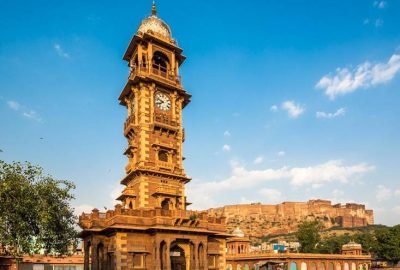
GHANTA GHAR
Ghanta Ghar, also known as the clock tower of Rajasthan, is situated in one of the busiest areas of Jodhpur, the Sadar Bazaar. It was constructed by Shri Sardar Singh Ji of Jodhpur. The Sadar Market is quite popular among tourists,
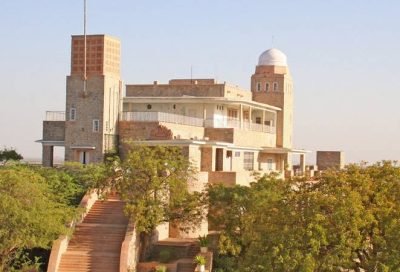
SARDAR SAMAND LAKE AND PALACE
Built on the banks of the Sardar Samand Lake by Maharaja Umaid Singh in 1933, the Sardar Samand Lake Palace is a spectacular hunting lodge. It remains the royal family's favourite retreat and houses.
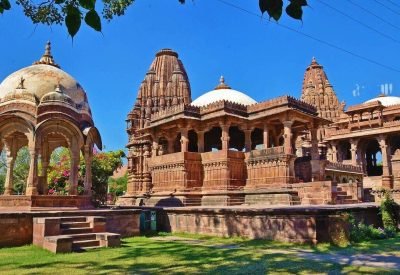
MANDORE
Jodhpur is the ancient capital of Marwar, Mandore. This area is of major historical importance and you will find the dewals or cenotaphs of Jodhpur’s former rulers. Unlike the original chhatri-shaped cenotaphs that are typical patterns of Rajasthan architecture
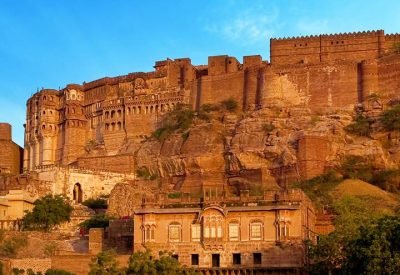
CHOKHELAO BAGH
Visit the Chokhelao Bagh, which sits at the foot of the Mehrangarh Fort. This over two hundred-year-old garden, complete with the scents, sounds, and textures of a garden of the eighteenth century Marwar has been turned into a Botanical Museum by the Mehrangarh Museum.
Things To Do
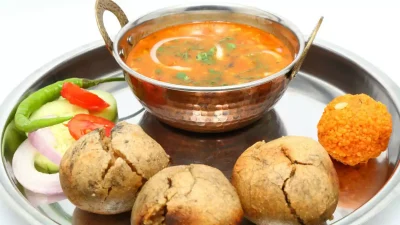
FOOD
Well, this is just what you need. The city, in fact the state of Rajasthan stands distinct with its rich culture and tradition. This vibrant state not only impresses with its architectural marvel, but also with the ever smiling faces that the locals sport.
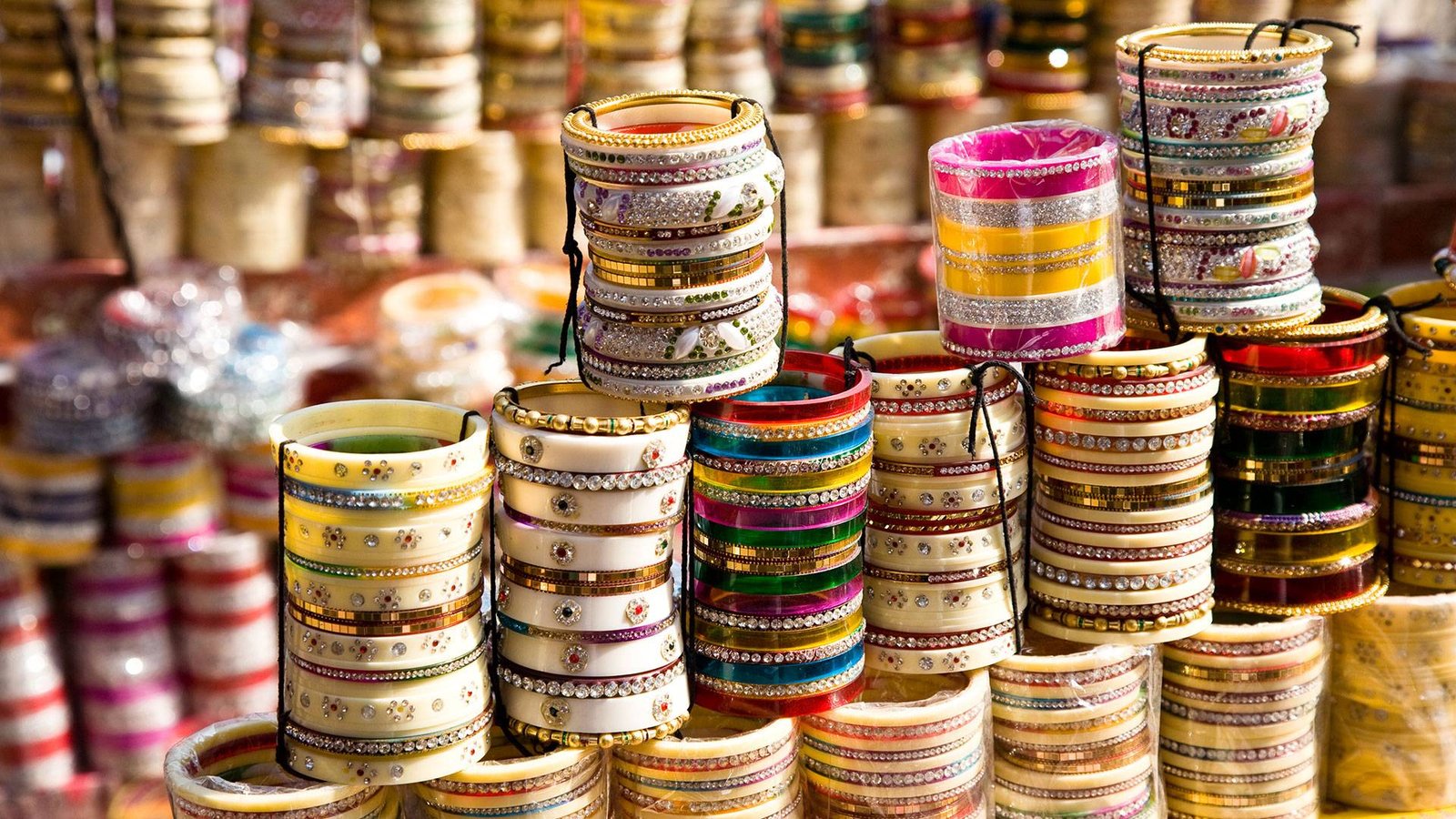
SHOPPING
Jodhpur is well-known for its Jodhpuri coats and breeches (riding trousers), tie-and-dye fabrics, embroidered camel leather footwear, lacquer work, cast toys and decorations. The main shopping areas of the city are Sojati Gate for gift.
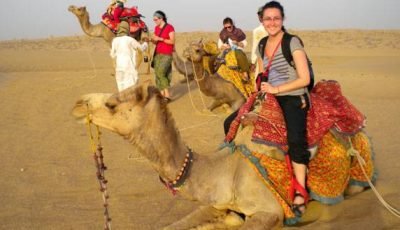
ENTERTAINMENT
Jodhpur is a city in the Thar Desert of the northwest Indian state of Rajasthan. Its 15th-century Mehrangarh Fort is a former palace that's now a museum, displaying weapons, paintings and elaborate royal palanquins (sedan chairs).
Best of Ajmer
THE AJMER SHARIF DARGAH
This is a Sufi shrine which encloses the ‘maqbara’ (grave) of Garib Nawaz, the Sufi saint Khwaja Moinuddin Chisti. Built in the 13th century, the shrine is popular among people of all faiths who flock here to have their prayers answered. The shrine has three gates – the main gate or the Nizam gate, the Shah Jahan gate erected by the Mughal Emperor and the Buland Darwaza. Another big draw at this holy shrine is the sacred and scrumptious food that is served to devotees. Cooked in giant cauldrons known as ‘degs’, devotees gather in throngs to be blessed by this prasad.
ATTRACTIONS & PLACES TO VISIT AND EXPLORE IN AJMER
Best of Ajmer
ADHAI DIN KA JHONPDA
Adhai Din Ka Jhonpda was first constructed as a Sanskrit college, but Sultan Ghori subsequently transformed it into a mosque in 1198 AD. The edifice, an exceptional example of Indo-Islamic architecture, was subsequently embellished by Sultan Iltutmish in 1213 AD. According to legend, the mosque was the site of a two-and-a-half-day fair held during Urs in the 18th century, which is why it is known as Adhai din ka Jhonpda (literally, The Hut of Two and a Half Days).
Best of Ajmer
ADHAI DIN KA JHONPDA
Adhai Din Ka Jhonpda was first constructed as
a Sanskrit college, but Sultan Ghori
subsequently transformed it into a mosque in
1198 AD. The edifice, an exceptional example
of Indo-Islamic architecture, was subsequently
embellished by Sultan Ilfutmish in 1213 AD.
According fo legend, the mosque was the site
of a two-and-a-half-day fair held during Urs in
the 18th century, which is why it is known as
Adhai din ka Jhonpda (literally, The Hut of Two
and a Half Days).
Best of Ajmer
SONIJI KI NASIYAN
The Soniji ki Nasiyan, popularly known as the Ajmer Jain Temple, honours Risabh or Adinath and is a superb example of elaborate building. It has a red stone entryway and a marble stairway within that is inlaid with carvings of the saintly Tirthankars, omniscient Jain masters who propagated morality. This temple, built in the late 19th century, is one of India’s wealthiest temples. Swarna Nagari, the main room, is appropriately titled the “City of Gold” since it has several wooden figurines that have been gold-plated. In his book “Jainism: A Pictorial Guide to the Religion of Non-Violence,” Kurt Titze makes reference to this renowned architectural masterpiece.
Best of Ajmer
KISHANGARH FORT
In Kishangarh, Rajasthan, there is a stunning fort called Kishangarh Fort. When one visits the fort, they will find prisons, granaries, armies, and other key structures there. The largest building there is called the Durbar Hall, and it was where the monarchs held daily formal sessions. The Phool Mahal, which is decorated with exquisite paintings and frescoes, is without a doubt the fort’s most beautiful location. It brilliantly displays the splendour of the Rathore clan’s monarchs. Several lakes, including Gundu Lav Talab and Hamir Sagar, are close to the fort and make wonderful picnic spots. if you wish to go back in time.
Best of Ajmer
KISHANGARH FORT
In Kishangarh, Rajasthan, there is a
stunning fort called Kishangarh Fort.
When one visits the fort, they will find
prisons, granaries, armies, and other key
structures there. The largest building there
is called the Durbar Hall, and it was where
the monarchs held daily formal sessions.
The Phool Mahal, which is decorated with
exquisite paintings and frescoes, is
without a doubt the fort’s most beautiful
location. It brilliantly displays the
splendour of the Rathore clan’s monarchs.
Several lakes, including Gundu Lav Talab
and Hamir Sagar, are close to the fort and
make wonderful picnic spots. if you wish
to go back in time.
Best of Ajmer
AJMER GOVERNMENT MUSEUM
One of the most popular tourist attractions in Ajmer is the government museum. The museum is located inside the opulent fortified palace of the fabled Mughal Emperor Akbar, which was constructed in 1570. The museum, also called the Bharatpur Museum, houses a substantial collection of artefacts from antiquity.
Best of Ajmer
VICTORIA CLOCK TOWER
Ajmer is a city that has seen major influence from the British in its past. The British left their legacy in many forms in Ajmer, some of which are in the form of educational institutions and architectural buildings in the city. While a couple of these buildings are located in the heart of Ajmer, one that immediately catches the eye of the visitor is the Victoria Jubilee Clock Tower. Located just opposite the railway station in Ajmer,
For Bookings Of Travel Packages, Car Rental & Luxury Hotels.
HOW TO GET HERE?

Airplan
Jodhpur is connected by air with Jaipur, Delhi, Udaipur and Mumbai. The airport is 5 km away from the city centre

Train
Jodhpur is connected by rail with major cities in India

Road
Jodhpur is well connected by motorable roads to different cities and places in India.



